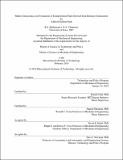Multi-criteria lifecycle evaluation of transportation fuels derived from biomass gasification
Author(s)
Stark, Addison Killean
DownloadFull printable version (998.8Kb)
Alternative title
Multi-criteria life cycle evaluation of transportation fuels derived from biomass gasification
Other Contributors
Massachusetts Institute of Technology. Dept. of Mechanical Engineering.
Advisor
Daniel Cohn and Ahmed Ghoniem.
Terms of use
Metadata
Show full item recordAbstract
The development of a domestic biofuel industry has been a major policy thrust of the United States federal government in the first decade of the 21st century. Cellulosic biofuels have been identified as the primary candidate for meeting long term sustainability and energy security goals. In this thesis potential cellulosic biofuels produced via thermochemical processing are analyzed. Thermochemical processing utilizes well established chemical synthesis technology and allows for both feedstock and product flexibility relative to traditional enzymatic biofuel production routes. In this thesis both Spark Ignition Engine fuels (Methanol, Ethanol, Mixed Alcohols, and Methanol-to-Gasoline Synthetic Gasoline) and Compression Ignition Engine fuels (Dimethyl Ether and Fischer-Tröpsch Diesel). The abovementioned fuels are analyzed on a lifecycle basis with respect to identified criteria affecting each fuels adoptability including: (1) energy efficiency, (2) cost of production and shipping, (3) integrability into the current distribution infrastructure and (4) compatibility with regulatory and policy landscape. A primary conclusion from this analysis is that no one fuel is optimal with respect to all metrics. Instead, it is likely that a variety of fuels should be employed for different applications. The US biofuel policy landscape is also analyzed in this thesis. It is found that the criteria above are not currently weighed in fuel adoption policies and instead parochial interests have carried more weight in the development of the US biofuel industry in which ethanol is the de facto fuel of choice. Therefore, it is likely to be difficult for a non-ethanol cellulosic biofuel industry to develop without major policy changes.
Description
Thesis (S.M. in Technology and Policy)--Massachusetts Institute of Technology, Engineering Systems Division; and, (S.M.)--Massachusetts Institute of Technology, Dept. of Mechanical Engineering, 2010. This electronic version was submitted by the student author. The certified thesis is available in the Institute Archives and Special Collections. Cataloged from student submitted PDF version of thesis. Includes bibliographical references (p. 125-133).
Date issued
2010Department
Massachusetts Institute of Technology. Department of Mechanical Engineering; Massachusetts Institute of Technology. Engineering Systems DivisionPublisher
Massachusetts Institute of Technology
Keywords
Engineering Systems Division., Technology and Policy Program., Mechanical Engineering.